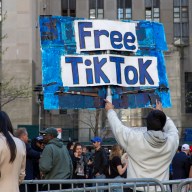Mahershala Ali is very proud of “Free State of Jones.” The historical drama tells the story of a group of ex-slaves, poor farmers and war deserters who, during the Civil War, mounted an insurgency against Confederate powers. Ali plays Moses Washington, a runaway slave who joins up with Matthew McConaughey’s Newton Knight, only to find his race suffering even after the war ends. Ali, who’s best known for playing Remy Danton on “House of Cards” and Boggs in the last two “Hunger Games” films, says what drove him to the film wasn’t just about telling a story that isn’t that well-known. This isn’t a typical Civil War movie, in part because it shows how difficult it was in the south for former slaves even after it was over. RELATED: Interview: Elle Fanning loved going to the dark side for “The Neon Demon” It doesn’t have the usual triumphant ending. It’s kind of downbeat. The whole film doesn’t hit the usual historical prestige picture marks. It not only tells a story that hasn’t been filmed before, but it tries to keep a certain complexity. It’s enlightening seeing a movie about the band they formed, which is really a utopia: There’s equality not only between races, but genders. That’s something we’re not close to achieving today, and it sometimes feels like we may never see that in our lifetime. I would imagine we have it easier than our parents. I have it easier than my parents and my grandparents. I’m sure there are some things about this time that are difficult and unique in terms of a challenge. But I’m positive I have more freedoms and opportunities. As an African American man, I’m of the second generation who can say, “This is what I want to be,” and go for it. You couldn’t do that two generations back. Back then it was about getting a job at a factory somewhere. We didn’t have access to college and education. I hope to be one of those who helps make this a better place for the next generation. RELATED: Interview: Todd Solondz on the pains of directing a mutt for “Wiener-Dog” I should ask about the actual making of the film. It must be emotional for you to recreate that time and play a runaway slave. I hope the punishment collar you wear early on wasn’t as heavy as the real ones. Follow Matt Prigge on Twitter @mattprigge
When we watch these Civil War pieces or projects, they always end with the signing of the Emancipation Proclamation. And that’s it. But the fact is there were these local laws that were instituted in the south that were basically another version of slavery. There were apprenticeship laws, black code laws, which made it very difficult to “exist” as a free black person at the time. There were tens of thousands of African Americans being lynched. The film addresses those. It’s more open-ended than we’re used to. When you walk away from the film you understand why we had Martin Luther King and the Civil Rights era, Malcolm X and the Black Panthers. “Free State of Jones” gives you a sense of what was to come.
It’s an honest ending. I wouldn’t say it’s downbeat. It’s honest. They don’t live happily ever after, which is usually what you walk away with in these blockbuster Hollywood films. Gary was honest about where our country was at the time.
Part of that was Gary [Ross, director] became such a student of the era. He worked on the project for 10 years. We had Harvard scholars there, who would go through the history. It was amazing to be in the presence of that and constantly hear Gary talk about the era and the stuff that didn’t make it into the film. There was so much information that we couldn’t put in there. Otherwise we would have had to do a trilogy, and I don’t know if anyone’s interested in seeing a trilogy about that. But he didn’t want to dumb it down and make easy-to-digest. He was interested in making it as honest and truthful and layered as possible.
We have to build it piecemeal. As much as we’re individuals, we’re also this big, living, breathing body. In some ways it’s getting healthier, and in some ways it’s deteriorating. There’s always work to do. We can look back at certain times and be happy and proud that we improved over the course of time. But in some ways things have gotten worse, and we have work to do in certain areas. I think it’s possible and achievable, but, as you said, I don’t know if we’ll see it in our lifetime. But the work has to continue to happen in a way that requires us to be patient.
Oh, it was the real deal. They had a stunt one I could wear. But I chose to wear the heavier one 90 percent of the time, because I just felt it informed me as an actor. It gave me a lot of emotional and physical information to work with. Just going back and being in that time, it was really a cathartic experience. Sometimes I would leave, after 15 or 16 hour days of shooting, and have an emotional moment in the hotel. But as far as being actor, that’s what you get up for. It’s what excites you. And socially it gives you the opportunity to tap into your responsibility to educate as well as entertain.


















